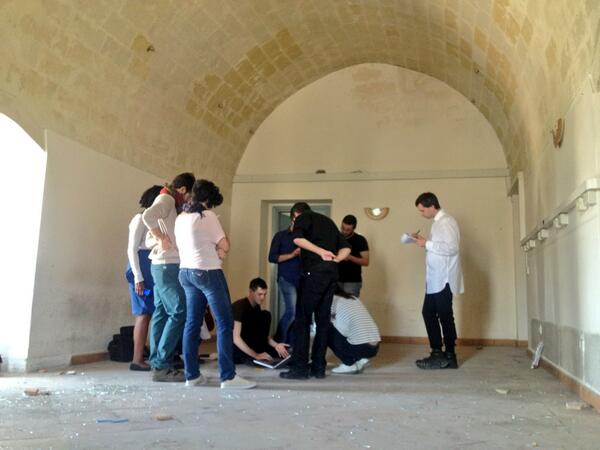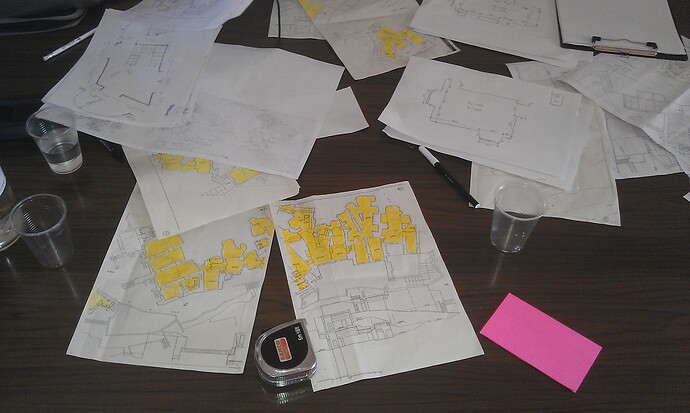
This weekend marked our second trip to Matera, the city set to host the first unMonastery – those in attendance were myself, Alberto, Nadia and Mike (Levitt) – in addition we were hosted by the MT2019 team and our new and indespensible collaborator Andrea Paoletti (who’s both an EdgeRyder and runs Casa Neutral in Matera).
Our first day (Friday) was focused on Mike’s role in mapping our future home, utilising a low cost technique involving a laser measure, DSLR and google sketchup, we hatched a plan to render the building as a downloadable model. Run as a small workshop with around 10 individuals from Matera including architects tasked with refitting the builoding – the intention was to produce a model for remote and distributed collaboration; the model, details of the event and the tutorial produced will be summarised in another post later next week. The blogpost you’re reading however is aimed at reporting on the overall progress of the project, setting out the challenges, sharing what we learned this weeked and putting the next steps in motion.
The core aim for the Saturday event was to build on and bore down into the outcomes from the first co-design session in March, our approach was three fold. Firstly we sought to narrow down and expand on the 43 challenges compiled last time by local participants into 10 concrete challenges, so that projects housed at the unMonastery can begin to respond directly to real needs. Secondly we aimed to co-write the international call, taking into account the main challenges highlighted as a criteria for submission.
The final part of the session was focused on imagening the possibilities of the space and asking those present “What kind of space do you want unMonastery to be?”, “What needs can it meet spatially?”, “Should we provide an open door policy that welcomes anyone in the local area in at anytime?”, “Should there be a fixed schedule and weekly timetable of events?”, “Should focus be on co-working or something else?” - these were some of the questions raised.
It’s important to say now this event was no walk in the park, throughout the course of the weekend we learnt many things. Perhaps one of the most prescient lessons was that creating space in Matera for events and happenings isn’t the real problem but rather getting people to attend and contribute to events that rely on co-production is the most difficult task. This probably sounds obvious but after the success and reception of the first event I personally thought we might be onto a good thing, being able to create continual traction with each event staged, this was a slight misjudgement. Instead of the 30+ strong crowd from last time, numbers were thinner on the ground – in part though this could be attributed to other events taking place in the city at the same time.
Regardless of numbers there was enough of us to form two seperate groups of around 6-8 and take on the challenges task, which has resulted in us now having 14 critical and more clearly defined challenges that Materans believe the unMonastery could begin to tackle. I’ve broken out this list into a seperate thread in order to fuel focused discussion on this specific area.
Challenges Post
Which leads us onto our second task, co-writing the international call and perhaps at this point it’s fair to say things began to unravel a bit but early on in the process we managed to capture a number of key requirements, including the information pack which Alberto has created the first iteration for. Again in order to maintain focused discussion the international call and evaluation process has been forked into a seperate thread.
International Call Post
Around the stage of shifting from co-writing the international call and migrating into co-designing the space we started to suffer from a loss of structure, the timeline for the call was looking exceptionally tight and slightly unmanagable. Add to this it was already late in the day and we’d been going strong since the morning, we began to get down to the nitty gritty of preparing the space to be livable and it was with this that a new set of problems were introduced – would the building be ready for September?
I think it’s important to pause for a moment and reflect.
One of the key lessons that has permeated the projects progress so far in Matera is that building trust is the hardest task, particularly in Matera, crossing the cultural devide not just between languages but between practice is even harder still. The ‘we can do this but only if we work together’ attitude that characterises EdgeRyders and other projects that each of us are involved in is a difficult thing to share, particularly when your offer isn’t exactly crystal clear – and this is something the unMonastery project needs to solve, and fast, in order to move forward.
And it was this combination of thought, timelines and trust, that gave rise to a new plan this weekend gone, aimed at building bridges of understanding, increasing capacity and beginning to reciprocate what Matera has given to us so far.
This new plan however is a big change - unMonastery will not be opening in September of this year, we’ve decided to push back the launch date to February 2014. This sudden re-evaluation of timescales comes with good reason, firstly there are hoops to be jumped through, as the process of refitting the building is not a simple one, it involves many stakeholders including local government. Secondly the timeline for the international call, the process required when public money is at stake requires that we be rigourous and fair in our evaluation of applicants, which means more time than anticipated. Since this is the prototype we want to try and get things right the first time and it’s safe to say we’re learning many useful lessons along the way that can help support other peoples projects in the future.
One key recommendation emerging from this process so far, (thanks to Nadia): When engaging with multiple stakeholders with a project of this nature, establish an organasational chart from the start with those you’re working with that illustrates responsibilies, the chain of command and a clear decision making process.
So with that said, what’s the good news? The answer lies in the question: how do we build bridges, capacity and begin to give back to Matera in advance of the opening? The plan: a two week unconference/festival with a combined effort between unMonastery, EdgeRyders and other interested parties in October./November. Myself and Nadia have begun to layout a rough plan for how this might happen and we’ll be to meeting soon, we’ll save more details for another post but if you’d like to get involved at this early stage email us: ben@unmonastery.eu / nnegash@unmonastery.eu
And that’s it for now, we’ll be setting out a plan over the coming weeks for this long form unconference, putting out the international call, updating the website, putting the 3d model online – all feedback and thoughts across the details covered in this post are greatly appreciated.
